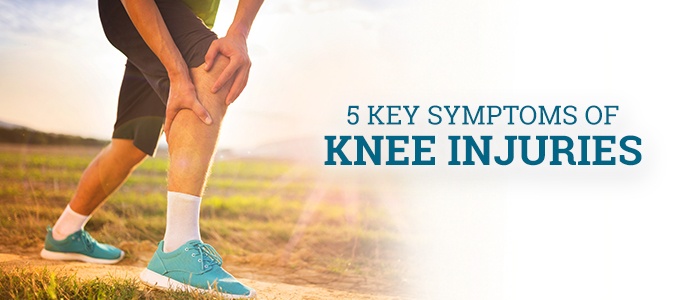
Your knees help you get from place to place. They help you stay active, and they help you perform daily activities at home and at work. But when unusual symptoms set in, which are serious and which are worth ignoring?
Here are five key symptoms of knee conditions that are worth keeping tabs on.
Pain When Moving
Pain—it's an obvious warning sign that something is going on with your knees. But the specific location of the pain and when it occurs (i.e., when moving or when sitting) can help determine the underlying problem. Tendinitis, for example, is a condition where pain is caused by kneecap-to-shin tendon irritation and the onset can sometimes be slow—especially when moving or exercising. Ice is a good first course of action in this case (when there's not an explainable incident to link the pain to), after which an orthopedic doctor should be called if pain persists.
Popping
Experience an audible "pop" or even the feeling of popping when moving your knee joint? If you're particularly active in health and fitness you may have experienced a knee injury—namely, an ACL injury, which is a particularly common ailment for athletes. If the popping is accompanied by pain, swelling or inability to fully utilize your knee, it's a good idea to get yourself seen by an orthopedic physician.
Heat
Is your knee emanating an unexplained warmth? Heat at the joint site—especially when caused by a fall or tumble—can be a sign of an orthopedic condition, such as bursitis. This type of ailment can lead to infection, so if the heat is accompanied by fever, swelling or unusual sensitivity, you should plan on setting an appointment to be seen by a knee or joint specialist.
Bruising
Have you had a recent impact to your knee that you may have simply ignored? If you begin to see bruising in the area, it might be more worth investigating than you might immediately suspect. Bruising from a collision or fall, particularly when it's accompanied by difficulty walking or bending the knee joint, can be attributed to a fracture of your kneecap. Make sure to schedule a physical examination if the bruising and pain is persistent.
Locking
The feeling that your knee is locked in place—whether it's in a bent or unbent position—can be a symptom of a variety of orthopedic conditions. One such ailment is a torn meniscus, something most commonly found in athletes who participate in physically aggressive sports and in seniors, whose knee joints have begun deteriorate with age. A locked knee is something that should be checked out by an orthopedic specialist who can determine if physical therapy or surgical treatment is necessary.


